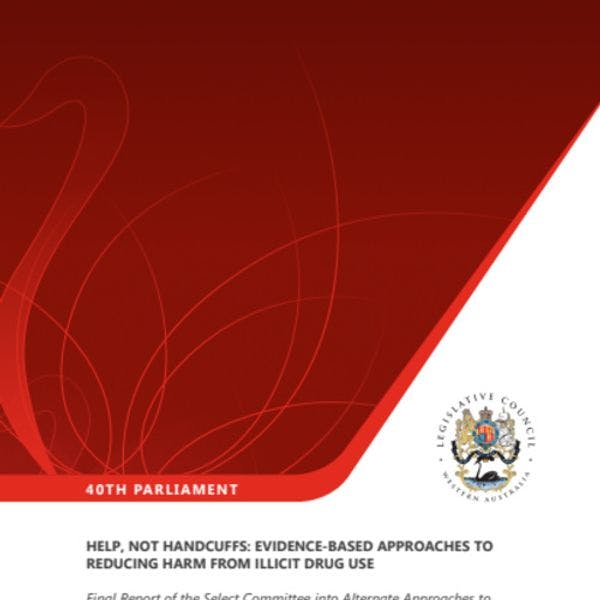Help, Not Handcuffs: Evidence-based approaches to reducing harm from illicit drug use in Western Australia
9 December 2019
By the Select Committee into Alternate Approaches to Reducing Illicit Drug Use and its Effects on the Community / Legislative Council, Western Australia
EXECUTIVE SUMMARY
- The Legislative Council established the Select Committee into Alternate Approaches to Reducing Illicit Drug Use and its Effects on the Community (Committee) on 17 October 2018. The Committee inquired into approaches to reducing harm from illicit drug use in other jurisdictions and compared their effectiveness to the approaches currently used in Western Australia (WA).
- The inquiry is specifically about illicit drugs, although the Committee heard about the high levels of harm associated with alcohol and prescription drugs. Importantly, the inquiry is concerned with drug users, and not people involved in the drug trade. The Committee inquired into approaches to addressing the use and possession for personal use of drugs, and not possession with intent to sell or supply, or the distribution of drugs.
- People always have, and always will, use drugs. Prohibition has not stopped this. In 2016, 43% of Australians had illicitly used a drug at some point in their lives. There is a growing recognition across the world that drug prohibition has increased the harms associated with drug use. Under prohibition, black markets have thrived, prisons have filled with drug users and those committing drug-related offences, and stigma is experienced by people who use drugs.
- The Committee has distinguished between non-problem and problem drug use. Most people who use drugs do so in an occasional, recreational way that does not adversely affect their lives or the community. The minority suffer from drug use disorder, and require treatment or support. Some people are more likely to develop drug problems than others. Factors including childhood trauma, economic disadvantage, unemployment, unstable housing and mental health issues are linked to problematic drug use. People living in regional and remote areas, and particularly Aboriginal Australians, are at greater risk of experiencing drug-related harm.
- Drug use is associated with health, social and economic harms to the people who use drugs, their family and friends, and the wider community. Drug use itself causes some of these harms, such as death, disease and drug-fuelled violence. Other harms are caused by the criminalisation of drug use or possession for personal use. A criminal record can affect employment, housing and educational opportunities. Prohibition also increases stigma, as people are less likely to seek help when they fear criminal action. These impacts can compound existing social disadvantage. The Committee found that all of these harms are present in WA, particularly given our high rates of problematic methamphetamine (meth) use.
